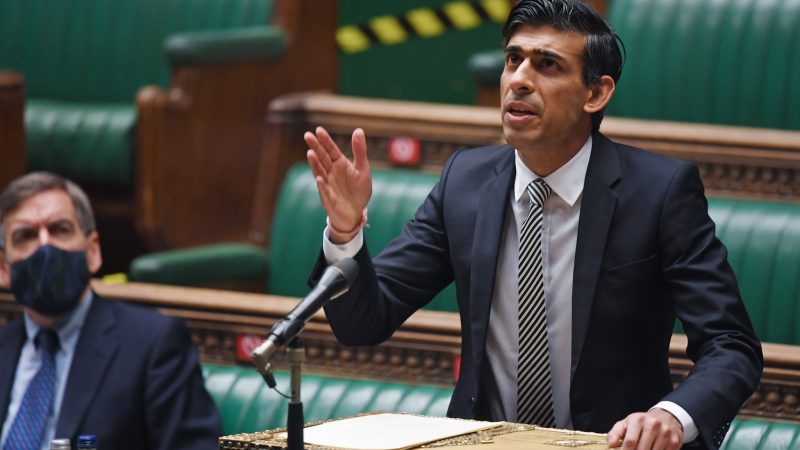
Keir Starmer has criticised the Budget today, saying it “barely mentioned inequality let alone tried to address it”, and declared that a Labour budget would have put the NHS and social care “front and centre” of its plans.
The Labour leader pointed out that Rishi Sunak did not have policies to fix the UK’s “broken social security system” and accused him of having to be “dragged kicking and screaming” on the Universal Credit uplift.
For the first time, Starmer told the public that Labour would keep the Universal Credit increase, introduced by the UK government for the coronavirus crisis, until a new social security system were put in place.
“One day these restrictions will end, one day we’ll all be able to take our masks off and so will the Chancellor, and then you’ll see who he really is,” the opposition leader told the House of Commons in his response to the Budget.
“This Budget sets it up perfectly. Because this is a Budget that didn’t even attempt to rebuild the foundations of our economy. Or to secure the country’s long-term prosperity. Instead it did the job the Chancellor always intended: a quick fix.
“Papering over the cracks. The party opposite spent a decade weakening the foundations of our economy. Now they pretend they can rebuild it. But the truth is: they won’t confront what went wrong in the past and they have no plan for the future.”
The Chancellor announced today that personal tax thresholds – after an increase – will be frozen from next year until 2026, and that corporation tax will increase to 25% – higher than many had expected – in 2023.
He stressed that as corporation tax is only charged on company profits, struggling businesses will be unaffected, and said a new small profits rate would be introduced at 19% for businesses with profits of less than £50,000.
A new ‘super deduction’ was also revealed, allowing businesses to claim 130% of their new machinery cost as a tax cut, in a bid to get companies investing. Sunak described it as “the biggest business tax cut in modern British history”.
Following a row over Labour’s position on a potential corporation tax rise, Starmer suggested in his response that his party would not oppose Sunak’s increase as “it’s right” that the rise is not taking place this year or next year.
“Of course in the long run corporation tax should go up,” the Labour leader said. He added that “no taxes should have been raised in the teeth of this economic crisis” and drew attention to council tax hikes this year.
Sunak also confirmed that the furlough scheme would be extended until the end of September, and two final self-employment support grants will include 600,000 more recently self-employed people.
Businesses will be asked to contribute to furlough more from July, and more again from August. Self-employed individuals whose turnover has fallen by 30% or more will continue to get the full grant; others can get a 30% grant.
Starmer welcomed that 600,000 self-employed people would now be eligible for Covid support, and said Labour would “look at the details”, but added that the figure given by Sunak suggested “millions will still be left out in the cold”.
The Universal Credit uplift will also be extended to September, but in the form of a one-off £500 payment rather than £20 extra per week. There was no mention of legacy benefits, which have not been uprated during Covid.
The Chancellor said the national living wage would go up to £8.91 from April. He unveiled an extra £19m for domestic violence services and an extra £10m to support veterans with mental health needs.
Incentive payments for firms taking on apprentices will be doubled, there will be a £300m culture recovery fund, new loan schemes for business, plus cuts in business rates, VAT for hard-hit sectors and stamp duty.
Sunak’s mortgage guarantee scheme, apparently aimed at making home ownership more accessible to those with a smaller deposit, was heavily criticised by Starmer, who said “it’s what Osborne and Cameron came up with in 2013”.
On subsiding 95% mortgages, the Labour leader told MPs: “What did that do? What did that do? It fuelled a housing bubble, it pushed up prices, and made owning a home more difficult. So much for ‘generation buy’.”
Summing up, Sunak emphasised that the government support goes beyond the current roadmap for relaxing coronavirus restrictions, and he told the chamber it amounts to £407bn in total over this year and the next.
His final “rabbit from a hat” policy was free ports, which have been criticised by Labour on a national level. Bridget Phillipson said in a LabourList piece that they are “hardly the silver bullet the Tories like to suggest”.
Often accused of ignoring the impact of Brexit, Starmer chose to raise difficulties experienced by businesses as a result of increased red tape and delays, plus financial services being excluded from the UK-EU deal.
More from LabourList
Nudification apps facilitate digital sexual assault – and they should be banned
Diane Abbott suspended from Labour after defending racism comments
Labour campaign groups join forces to call for reinstatement of MPs